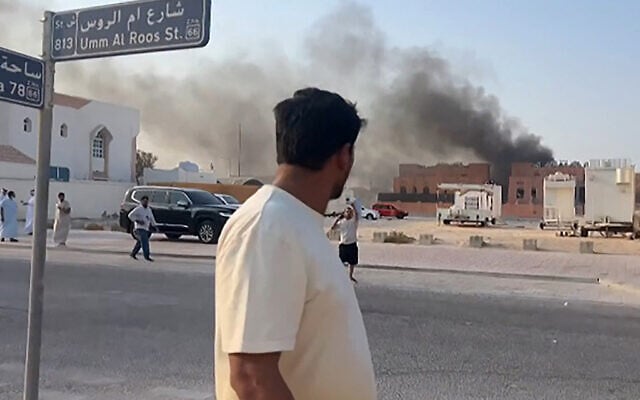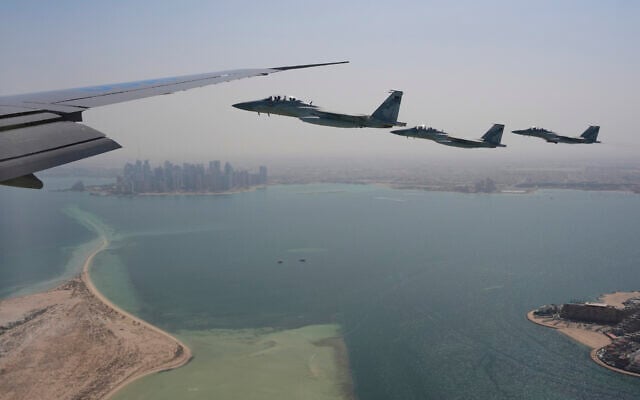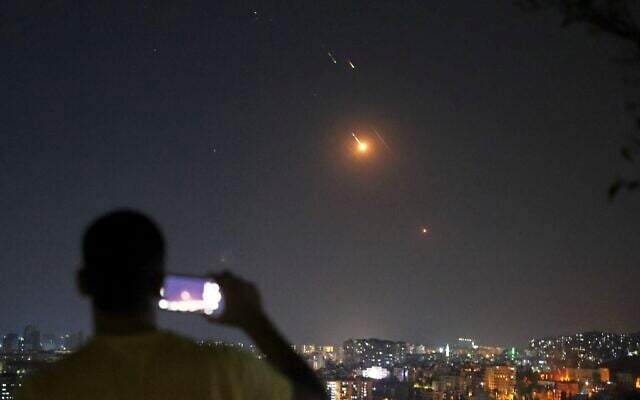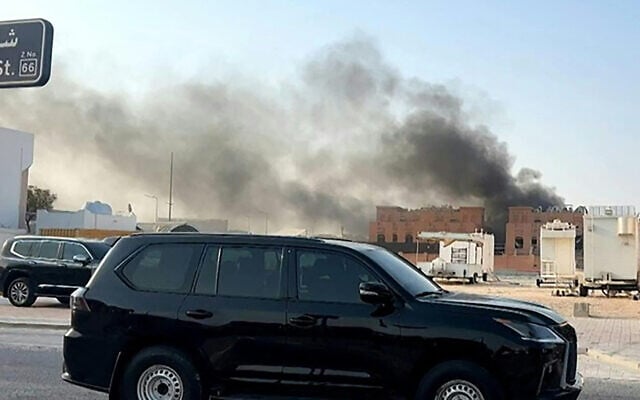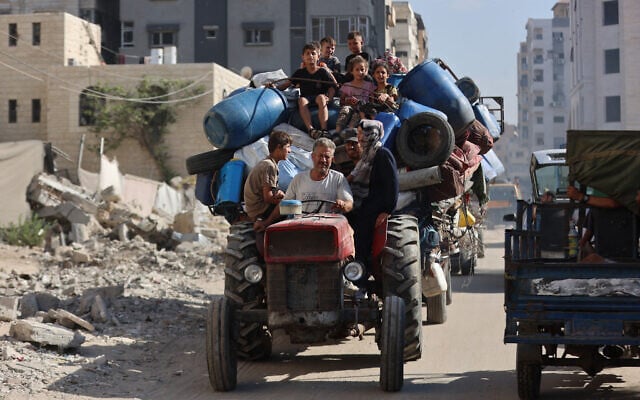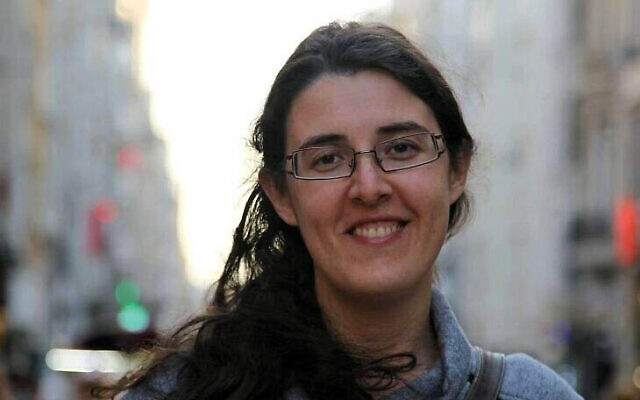


Below is a full transcript of today’s Daily Briefing:
Amanda Borschel-Dan: Welcome to the Times of Israel’s Daily Briefing. Today is Wednesday, September 10, day 705 of the war.
Amanda Borschel-Dan here with our military reporter, Emanuel “Manny” Fabian, and diplomatic reporter Nava Freiberg. Thanks for joining me today.
Emanuel Fabian: Amanda. Hi, Nava.
Nava Freiberg: Hello to you both.
Amanda Borschel-Dan: Israeli officials quoted anonymously today in several Hebrew-language news sites appear to cast increasing doubt on the success of a bold strike in Qatar yesterday that targeted the leaders of the Hamas terror group’s Politburo [Political Bureau]. Many will take us through this strike, and Nava will update us on the international responses to it so far. We’ll also learn about Elizabeth Tsurkov, an Israeli-Russian graduate student who was freed from two years of captivity in Iraq yesterday. All of this and more when we’re back.
And we’re back. I’m Amanda Borschel-Dan here with our military reporter, Emanuel Fabian, and diplomatic reporter Nava Freiberg. A bold Israeli airstrike targeted a meeting of Hamas’s top leaders in Qatar’s capital, Doha, yesterday. According to some reports, the leadership had gathered to discuss a new U.S.-sponsored hostage ceasefire proposal aimed at ending the war in Gaza. At recording time, reports differ as to whether the attack was successful. So Manny, let’s hear about the strike. Take us through it. What do you know so far?
Emanuel Fabian: So from a sort of technical standpoint of the strike, it was carried out by the Israeli Air Force [IAF]. So we’re not talking about some undercover Mossad operation trying to reach Hamas’s leaders abroad, but a regular airstrike by more than 10 IAF fighter jets, each of them dropping at least one munition. So we’re talking about more than 10 munitions that were dropped and within a few seconds, they all struck this building in Qatar, in Doha. We saw a report this morning that the Air Force just didn’t enter Qatari airspace during the strike, which isn’t particularly surprising because Qatar is very, very small and Israeli missiles do have some range and even if they didn’t fire very long-range missiles, they didn’t need to actually enter the airspace to carry this out. And in terms of who was actually killed there, we don’t really know. Hamas has announced deaths of several, I would say, low-level members, bodyguards, advisors, the son of Khalil al-Khaya [Humam al-Khaya], the senior Hamas official, an office director, but the leaders themselves, they have not confirmed. And we are, of course, hearing these reports today that Israel is increasingly skeptical or maybe even worried that the strike was not successful and didn’t actually hit these leaders, but we still haven’t seen proof yet that they are indeed alive.
Amanda Borschel-Dan: Okay. For the geographically challenged among us, let’s talk about how far away is Doha and how does this strike compare with other very far away strikes that the IAF has conducted in the past two years?
Emanuel Fabian: It’s about the same as sort of reaching Iran and Israel did reach Iran many times during the 12-day war just a few months ago. But Qatar is around, I think, 1,800 kilometers from Israel, similar distance to the Houthis in Yemen and Israel has quite a lot of experience with reaching the Houthis. Aerial refueling was carried out during the strike for these fighter jets to get there and back, basically with the air force refueling them on the way there and on the way back.
So, really, from a technical standpoint, it’s not the most complicated strike that the air force has carried out, especially if you compare it to all the strikes in Yemen and in Iran. There was no, as far as I understand, Qatar didn’t actually detect the fighter jets or the missiles, they didn’t engage them with their air defenses or anything like that. Israel supposedly notified the US [United States] at some point, probably as the jets were already there, so Qatar wasn’t aware that this was going to be carried out and they weren’t able to sort of do anything to stop it.
Amanda Borschel-Dan: And in terms of the flight path, would other countries have to have had agreed to this kind of strike? Meaning, is there any kind of international cooperation at all? Even though Israel, of course, conducted the strike alone?
Emanuel Fabian: I’ll say no and very carefully without sort of saying exactly which countries Israel flew over, but there’s countries that Israel doesn’t necessarily need to ask to fly over them, like Syria and Iraq. Jordan, perhaps Israel would need to ask, but they didn’t necessarily fly over Jordan to reach that area.
Amanda Borschel-Dan: Okay. Nava, so Defense Minister Israel Katz has rejected all criticism of the decision to go after Hamas in the US-allied Qatar. And he said, yet again, this has been said throughout the war, that Israel will not allow the group to find safe haven anywhere. So his quote today was, Israel’s security doctrine is clear. Its long hand will act against its enemies everywhere. There’s nowhere they can hide. Now, diplomatically speaking, that’s a bit on the nose, shall we say. And I wonder how the US-allied Qatar is responding to the attack on its own soil.
Nava Freiberg: Yeah. So you see criticism of this strike pretty much across the board. And so in terms of Doha, we don’t yet know the results of the strikes. So it’s very hard to say how exactly it’s going to affect the hostage shocks or anything beyond that moving forward. We do know that they are very unhappy with it, the Qataris. They issued a statement and call it a criminal assault, a blatant violation of international law. It threatens the safety of Qatari residents in Qatar. But, you know, their ability to respond, at least militarily, it’s very limited. They’re not a military power and they’re a tiny country. So what they can do is respond, you know, they have a lot of diplomatic power.
According to Hebrew media reports, Qatar has informed Israel that they’re suspending its role as mediator or freezing it. But those reports are not confirmed. So in regard to hostage talks, we still have to see what’s going to happen. But broadly speaking, Qatar has a lot of influence in the region. They’re the main funder of the Lebanese army. They have a lot of investments in Egypt. And of course, they have that key influence over Hamas.So we definitely have to be cautious and see what they’ll choose to do as their response.
Amanda Borschel-Dan: Okay, Manny, chime in a little bit about Qatar’s military prowess, if they have.
Emanuel Fabian: So Nava’s correct. Qatar is a relatively small country. They have a military. I would say it’s potent. They have an air force with, you know, modern fighter jets. They have Typhoons and F-15s, you know, expensive toys. But it’s sort of hard to say how much competency they have, how many. They have had engagements, especially against this, you know, with the Saudi intervention in the Yemeni civil war against the Houthis.
The Qataris were involved there, and they were also involved in the Syrian civil war and in the Libyan and even in the Gulf War back in the day. But they clearly do not have the experience that Israel has. The Israeli Air Force, I would argue, is probably the most experienced air force in the world currently, considering the past two years of war and fighting a direct war against Iran and achieving total air superiority over Iran’s skies. I don’t think Qatar would choose to try and engage militarily against Israel. I don’t think they’re really capable of that, but they do have the tools to potentially do so. I wouldn’t take their sort of their capabilities that lightly, but I think it’s a little bit unrealistic to see them try and attack Israel directly.
Amanda Borschel-Dan: You know, after the strike was publicized yesterday, there was a very soon after a Houthi missile that came or attempted to cross into Israel. And honestly, when I heard the sirens, I was thinking, is this Iran retaliating for this attack on Qatar? I know it sounds a bit far-fetched and perhaps a bit paranoid because, you know, that is my mind. But I wonder if the IDF [Israel Defense Forces] is prepared for this kind of scenario as well, Manny.
Emanuel Fabian: If Iran’s going to respond, then it would be a response to the attack on Hamas, not necessarily against Qatar, because, of course, Iran and Qatar do not get along very well. Right. Obviously. In fact, it’s funny, Qatar has been targeted twice now in the past few months, first by Iran and then by Israel, which are, of course, enemies against each other. Iran was targeting US assets in Qatar and Israel was targeting Hamas assets in Qatar. So Qatar like to host everyone, it seems, but it is possible that if we see potentially that Hamas leaders are killed, then Iran would like to try and respond, just like they responded against Israel to the killing of Hassan Nasrallah (third Security-General of Hezbollah until his assassination in 2024) in Lebanon exactly a year ago, actually now.
Amanda Borschel-Dan: All right. Let’s go to a short break.
And we’re back. I am Amanda Borschel-Dan here with our military reporter Emanuel Fabian and diplomatic reporter Nava Freiberg. Now, the UN [United Nations] Security Council will meet this afternoon to discuss Israel’s attack on Hamas’ leadership in Qatar. And Nava, let’s talk about global leaders’ reactions. So US President Donald Trump said he wasn’t notified in advance of the strike, as many noted. And his main quote from yesterday is, I’m just I’m not thrilled about the whole situation. We want the hostages back, but we are not thrilled about the way that went down today.
Nava Freiberg: So, I mean, definitely on Israel’s end, you know, the main concern is how the US would respond to a strike like this, being given its close relationship also to Qatar. And Trump, after the strike, he held a phone call with with Qatar’s Emir [Tamim bin Hamad bin Khalifa] al-Thani. And he, I think shortly after that, both the White House and Trump issued very similar statements. They distanced themselves completely from the strike, but it was a bit of a nuanced statement.They said it could present an opportunity for peace and definitely was critical of Hamas leaders getting immunity in Qatar. But it said this doesn’t advance our goals. And Trump also gave a guarantee that he said he told Qatar this this won’t happen again on your soil.
So it’s Trump sort of has to play this game where he has to not be overly critical of Israel and say they made this big disastrous mistake, but also not upset the Qataris too much. In the US-Qatar relationship, I’ll just to note, Qatar has really succeeded to make itself a key mediator in various roles in the Middle East with the US The Biden administration used them to talk to the Taliban, to talk to Iran. They gave them this officially a major non-NATO [North Atlantic Treaty Organization] ally, which is the special status that gets different defense and security benefits.
And the Trump administration has basically continued along that line. Lazar Berman, our diplomatic correspondent, when he was in the White House in February, asked Trump directly, you know, what do you make of Qatar’s role in the region and in Gaza? And I’m not quoting Trump exactly, but I think he said tough position, great job, something like that. So he publicly endorsed them in that respect. So Trump, he’s expressing his displeasure. But again, he’s playing that game of trying to not escalate too much on either side. You know, he’s guaranteed that this won’t happen again. He’s Trump. So he could change his mind. And it could be that, you know, in the future, if we see if we need an opportunity to meet again like this, we could maybe convince the US of it. But the results of the strike are going to play a big role. And if we didn’t get the strike, if we didn’t get the desired results, it’s going to be very hard to try and take them out, at least in Doha again.
Amanda Borschel-Dan: OK, let’s talk about the greater global reaction as well. And of course, condemnations have been coming in from around the globe, perhaps especially Europe and not surprisingly as well, Japan. So what are the main highlights of the condemnations from around the world?
Nava Freiberg: Sure. So I’ll just start with the Gulf itself in terms of that area. Since 2021, there’s been a reconciliation process that has begun with Qatar. They rejoined the GCC, the Gulf Cooperation Council. And so their neighbors are definitely coming to their defense. And as happy as they would be to see Hamas targeted, you know, they’re not they’re not supportive of Hamas. They’re not going to back Israel over over Qatar. So they’re definitely critical of the strike, you know, the Saudis and the UAE [United Arab Emirates]. And they’re speaking more broadly. There’s also a risk here. There’s a growing discourse that Israel is becoming so aggressive and powerful in the region to an extent that they’ll invade or violate sovereignty of other countries. And so they’re growing wary of that.
And this strike in Doha, which is a country it’s not at war with, it’s not Iran, it’s not it’s concerning to them. And so there’s there’s it’s definitely going to add to that to that concern that Israel is becoming sort of this destabilizing force. In the region in that way. Moving to Europe and I mean, beyond Europe, we have basically all of our European, many of our key allies in Europe condemned the strike. You also saw condemnations from Japan, China, Russia. So it was really, really broadly criticized.We had statements from British Prime Minister Keir Starmer, French President Emmanuel Macron, Germany, which is Israel’s closest ally after after the US.
They were also disapproving. Other foreign minister called it called the attack unacceptable. Spain, which this week is we’re having a rough week with Spain, and they’ve issued new measures against Israel, including arms embargo and boycott on certain goods. They condemned the strike. Our foreign minister actually hit back at Spain. And so there’s there’s an ongoing harsh rhetoric between us and Spain. And then the United Nations and European Union [EU] also condemned. You noted that the United Nations Security Council is meeting right now to discuss the attack. I can give a note on our ambassador to the UN, Danny Danon. He said that he intends during the UN’s meeting today to emphasize that we’re going to continue going after these terrorist figures, no matter where they are, sort of shrugging off, you know, the condemnations, which we’ve broadly seen Israel, Israel do in response following the strike. And our US ambassador also emphasized on FOX News that, you know, if we even if we missed this time, we’ll get them next time. So you see Israel being largely defiant in light of all this criticism.
Amanda Borschel-Dan: All right. Thank you.
Now, Manny, let’s quickly hear an update on what’s happening in Gaza. And I understand there’s a sharp uptick in those who are evacuating from Gaza City, but it’s nowhere near the numbers that we need in order to start the operation there. What’s happening?
Emanuel Fabian: So in the past day, tens of thousands of Palestinians have left Gaza City following the first sort of official widespread evacuation order for all of Gaza City. So in total, we’re talking around 150,000 to have left so far out of the million. On Sunday, Netanyahu said that 100,000 left. So in the past day, we’re talking about 40,000 or so who have left. It’s definitely an uptick following the evacuation order and following fresh strikes. But of course, there’s still around 900,000 Palestinians still in Gaza City. And carrying out a ground offensive in that sort of area will be very difficult for Israel, if not impossible.
But I think what we may see is that as the troops start to push in, then more people will leave, similar to what happened in Rafah and in other areas of the Strip. Now, people just tend to leave when they do see the army approaching. But that’s what we’ll see when that happens. But meanwhile, there are more strikes. The Air Force took down a high-rise tower in Gaza City a short while ago after issuing an evacuation warning for the area. And I think we’ll continue to see these sort of strikes over the coming days until this ground offensive is launched. I think there’ll be a point where Israel sees that enough people have left already and then to begin the ground operation.
Amanda Borschel-Dan: And high-rise, just to qualify that statement, is about 10 to 15 floors here. We’re not talking about New York or Doha. So let’s finish the program with talking about Elizabeth Tsurkov, who was freed yesterday and released to a US embassy in Baghdad. Manny, just quickly get our listeners up to speed again about who she was and why she was taken in Iraq.
Emanuel Fabian: So Elizabeth, who I actually know from before she was kidnapped, of course, she was in Iraq. She’d been in Iraq previously as well. She was a student at Princeton University. She’s Israeli and Russian, so not American, although the Americans were involved in getting her out. But she was abducted by the Kataeb Hezbollah militia, not to be confused with Lebanon’s Hezbollah. It’s a different group, unrelated. The only thing that links them is that they’re both somewhat backed by Iran, I guess. It’s an Iraqi militia. It’s a bit random, actually. They kidnapped her in March 2023, claimed she was spying for Israel, something that, of course, Israel and her family has denied.
There was a video that this militia actually posted in a coerced statement that she was made to say that she was working for the Mossad or something like that. But the US was involved in getting her to be released. Her sister is American. I think that’s where the connection comes from. And Israel, I don’t think, sort of even has the ability to even negotiate with Iraq. We don’t have relations with Iraq. So it was a bit of a difficult situation. And I don’t know how much the Russians were involved. Of course, she has Russian citizenship. I remember that at the time when she was kidnapped, and I tried to speak to Russian officials about the kidnapping, and they didn’t give any information about this. So Israel was monitoring the situation and working behind the scenes to try and get her to be released. But this was spearheaded by the Americans. And she’s now been released. And from what I hear, she’ll be back in Israel on Wednesday.
Amanda Borschel-Dan: Great. And we understand that she was meant to be treated in hospital, just as the hostages from Gaza were treated after their release from Hamas and other terrorist groups. Now, Nava, do you have any more information about Tsurkov in terms of how she was released?
Nava Freiberg: You know, it’s an ongoing report. (Prime Minister Benjamin) Netanyahu issued a statement saying that he was Israel, our hostage point man. Gal Hirsch (former military commander) was involved. Both Gal Hirsch and Netanyahu said that they had spoken with her family following her release. And I think Hirsch also said that she was aware even during her captivity that Israel was working to try and free her. In terms of the nitty gritty exactly how this was involved, we don’t know. I can note one report that there might have been, I think this came from Arabic media, but I’m not sure, that there was even a release of prisoners from Lebanon in exchange for her. And so also the details about if this was sort of, you know, a gesture to the US to, you know, have US forces leave Iraq. There’s different things being said, or maybe there was a prisoner release exchange. It’s ongoing, but yeah, that’s what I have for you right now.
Amanda Borschel-Dan: Okay, please check out the live blog for more updates.
Manny, Nava, thank you so much for joining me today.
Nava Freiberg: Thank you, Amanda.
Emanuel Fabian: Thank you.
Amanda Borschel-Dan: Thanks for listening to The Times of Israel’s Daily Briefing. Please check out another installment tomorrow. This episode was produced by The Podwaves. And if you have any comments or questions about this or any other episode, please drop us an email to podcast at www.timesofisrael.com. Until tomorrow. Shalom.


